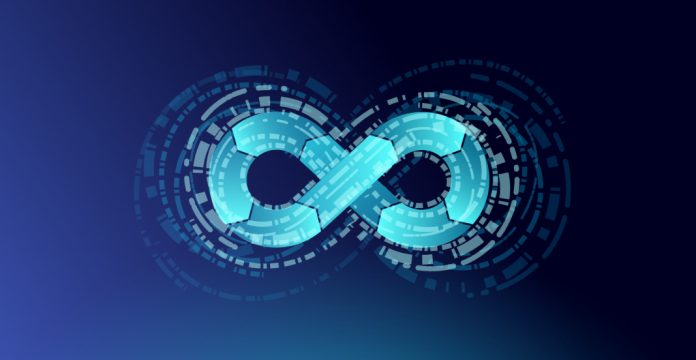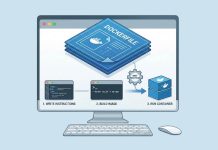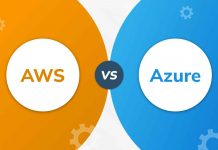
The integration of Artificial Intelligence (AI) in the DevOps process has the potential to revolutionize the way software is developed and delivered. As the pace of business continues to accelerate, organizations are looking for ways to improve efficiency, reduce errors, and increase collaboration among teams.
AI can automate repetitive tasks, identify and predict failures, optimize performance, and enhance collaboration and communication, making it a valuable tool for organizations looking to stay competitive in today’s fast-paced business environment.
In this blog, we will explore how AI can be applied in the DevOps process, real-world examples of organizations that have successfully implemented AI in their DevOps process, and the challenges and considerations when implementing AI in the DevOps process.
We will also look at future trends in using AI in DevOps and how it will shape the future of software development and delivery.
Let’s understand the role of AI in DevOps!
The Role of Artificial Intelligence in DevOps
Integrating Artificial Intelligence (AI) in the DevOps process has great potential. DevOps is a methodology that emphasizes collaboration, communication, and automation in the software development process, and AI (Artificial Intelligence) can play a significant role in enhancing these areas.
One of the key benefits of AI in DevOps is the ability to automate repetitive tasks. This can include testing, deployment, and monitoring, which can be time-consuming and error-prone for humans.
AI can perform these tasks quickly and accurately, freeing up time for developers to focus on more complex and creative tasks. Additionally, AI can identify and predict failures, allowing teams to address issues before they become critical problems proactively.
AI can also be used to optimize performance:
For example:
Machine Learning algorithms can analyze system performance and usage data and predict future resource requirements. This allows teams to make more informed decisions on scaling and capacity planning, leading to more efficient use of resources and improved system performance.
Another important aspect of DevOps is collaboration and communication among teams. AI can enhance collaboration by providing insights and recommendations to team members and automating information sharing.
For example, AI can automatically create and update documentation, reducing the need for manual updates and reducing the risk of errors. AI can also improve communication by providing real-time updates and alerts, allowing teams to stay informed about the status of their projects.
The Current State of AI in DevOps
The current state of AI in DevOps is still in its early stages, with many organizations experimenting with different ways to integrate AI into their DevOps processes. However, several organizations have already successfully implemented AI in DevOps.
The benefits they have seen include improved efficiency, reduced errors, and enhanced collaboration and communication.
One of the most widely adopted applications of AI in DevOps is automated testing and continuous integration. AI-powered test automation tools can automatically identify and execute test cases, reducing the time and effort required for manual testing. This can lead to faster release cycles and improved software quality.
Another area where AI is being used in DevOps is monitoring and log analysis. AI-powered monitoring tools can automatically detect and diagnose issues, reducing the time it takes to identify and resolve problems.
Additionally, AI-powered log analysis tools can automatically classify, group, and extract insights from log data, which can be used for troubleshooting and troubleshooting resolution.
AI is also being used in the area of self-healing and self-optimizing systems. AI-powered systems can automatically detect and recover from failures, reducing downtime and improving system availability.
Additionally, AI-powered systems can automatically optimize performance by analyzing data on system usage and making predictions on future resource requirements.
In addition to these specific applications, organizations can use general-purpose AI platforms and tools to integrate AI into their DevOps process.
These platforms and tools can automate repetitive tasks, identify and predict failures, optimize performance, and enhance collaboration and communication.
Overall, while the current state of AI in DevOps is still in its early stages, there are already many examples of organizations that have successfully implemented AI in their DevOps process and are seeing the benefits.
As AI continues to evolve and become more sophisticated, it will likely become an increasingly important tool for organizations looking to stay competitive in the fast-paced business environment.
AI in DevOps: How Can AI be Applied in the DevOps Process?
Artificial Intelligence (AI) can be applied in various ways throughout the DevOps process, including:
- Predictive maintenance: Predictive maintenance uses data, analytics, and AI to predict when equipment or systems will fail. This allows organizations to take proactive measures to prevent downtimes and avoid costly repairs.
- Deployment: AI-powered deployment tools can automatically identify and deploy updates and new features. This can lead to faster and more efficient deployment processes and improved software quality.
- Collaboration and Communication: AI can enhance collaboration by providing insights and recommendations to team members and automating information sharing. For example, AI can automatically create and update documentation, reducing the need for manual updates and reducing the risk of errors. AI can also improve communication by providing real-time updates and alerts, allowing teams to stay informed about the status of their projects.
- Optimizing and scaling: AI-powered systems can automatically optimize performance by analyzing data on system usage and making predictions on future resource requirements. This allows teams to make more informed decisions on scaling and capacity planning, leading to more efficient use of resources and improved system performance.
- Security: AI-powered security tools can detect and respond to security threats in real time. This can lead to improved security and faster response times.Overall, AI can be applied in various ways throughout the DevOps process, allowing organizations to automate repetitive tasks, improve efficiency, reduce errors, and enhance collaboration and communication.
Enroll in Invensis Learning’s DevOps courses and master the most in-demand process used across industries!
Use Cases of AI in DevOps
There are several use cases of AI in DevOps, including:
- Automatic provisioning: AI can automatically provision and configure infrastructure, reducing the time and effort required for manual setup.
- Continuous integration and delivery: It can automate the building, testing, and deploying of software, allowing for faster and more efficient delivery of new features and bug fixes.
- Monitoring and troubleshooting: It can monitor systems and applications for performance issues and diagnose and fix problems as they arise automatically.
- Predictive maintenance: AI can predict when equipment or systems will fail, allowing for proactive maintenance and reducing downtime.
- Security: It can identify and mitigate security risks, such as detecting and blocking malicious network traffic or identifying vulnerabilities in code.
- Resource optimization: It can optimize resource allocation, such as scaling up or down the number of servers based on demand, to ensure that resources are used efficiently.
Challenges of Implementing AI in DevOps Process
There are several challenges to implementing AI in DevOps process, including:
-
Data Quality and Availability
For AI models to be effective, they require large amounts of high-quality data. Ensuring that data is accurate, complete, and properly formatted can be a significant challenge.
-
Model Interpretability
AI models are often complex and difficult to understand, making it hard to diagnose problems or explain how decisions are made. This can be a challenge when trying to integrate AI into DevOps processes.
-
Integration with existing systems
Integrating AI models into existing DevOps processes and tools can be difficult, as it may require significant changes to existing infrastructure and workflows.
-
Alignment with Business Objectives
It can be challenging to align AI models with business objectives, such as ensuring that they make decisions that align with company goals.
-
Explainability
AI Models are very complex and hard to explain, making it difficult for people to understand how decisions are made.
-
Lack of Expertise
Implementing AI in the DevOps process requires specialized knowledge and skills, which can be difficult to find and retain.
-
Ethical Considerations
There are ethical considerations to consider when implementing AI, such as ensuring that models do not perpetuate biases or discriminate against certain groups.
Future of AI in DevOps
The future of AI in DevOps will likely involve greater use of Machine Learning and deep learning algorithms to automate tasks and improve software development and deployment efficiency and effectiveness.
This may include using AI to optimize build and test processes, predict and prevent production issues, and manage and scale infrastructure. Additionally, AI-powered monitoring, logging, and alerting tools are expected to become more prevalent in DevOps.
Here are some specific ways in which AI is likely to be used in DevOps in the future:
- Automation of repetitive tasks: AI can automate tasks such as building and testing code, saving time and reducing errors. For example, Machine Learning algorithms can identify code patterns likely to cause bugs and then automatically test for these bugs before the code is deployed.
- Predictive maintenance: It can predict and prevent production issues by analyzing logs and monitoring data. For example, Machine Learning algorithms can identify patterns in log data that indicate a problem is likely to occur and automatically trigger an alert to address the problem before it causes a service interruption.
- Infrastructure management: It can manage and scale infrastructure, such as cloud-based resources, in real time. For example, deep learning algorithms can predict future resource usage and automatically scale resources up or down to meet demand.
- Monitoring and logging: AI-powered tools can monitor and log system performance, network traffic, and application behavior and automatically identify and diagnose issues.
- Security: AI can detect and respond to security threats in real-time. For example, Machine Learning algorithms can be trained to identify and flag suspicious activity, such as attempted unauthorized access.
The goal of AI in DevOps is to help organizations to deliver software faster, with greater reliability and security.
By automating repetitive tasks, predicting and preventing production issues, managing, and scaling infrastructure, monitoring, and logging system performance, and detecting and responding to security threats, AI can help to streamline the software development and deployment process and reduce the risk of errors.
Conclusion
Artificial Intelligence (AI) has the potential to revolutionize the field of DevOps by automating repetitive and time-consuming tasks, improving the accuracy and speed of decision-making, and helping to identify and mitigate potential issues before they occur.
However, it is important to remember that AI should not be viewed as a replacement for humans. Organizations can increase efficiency, reduce costs, and improve software development and delivery quality by properly integrating AI in DevOps process.
As AI continues to evolve and mature, we expect to see even more exciting developments in AI-powered DevOps shortly.














